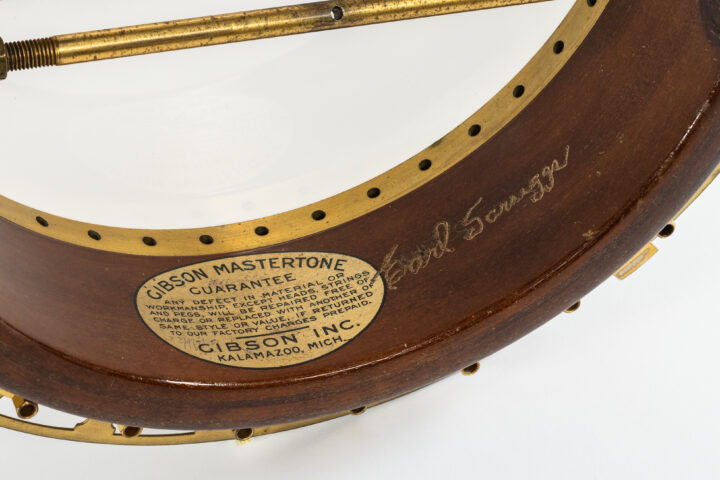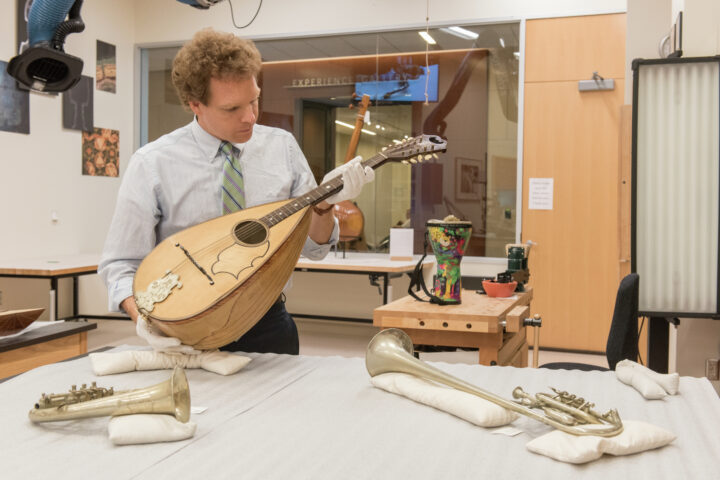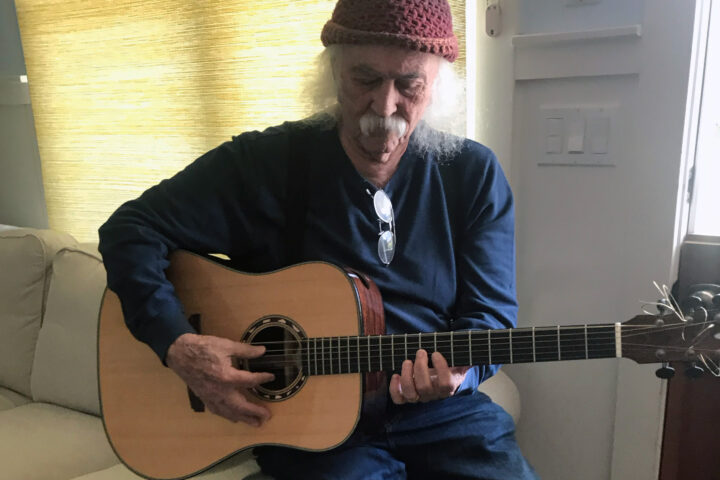“I’m really happy,” David Crosby explains. “My life is very good right now.”
Croz is talking to me via Zoom from one of his favorite places, Sunset Sound recording studio in Los Angeles, where he’s recording a forthcoming 2022 record with his Lighthouse band. His spirits are high.
“It’s going fantastically well. It’s just a crazy chemistry. It’s explosive,” he says with a grin. “It’s good, man. It’s fucking good!”
His enthusiasm is infectious… and understandable. Crosby’s creative streak over the last decade is something to behold. While many a Rock & Roll Hall of Famer will namedrop younger musicians they admire, Crosby – at the age of 80 – goes one step further and actually collaborates with them, making new music. He’s surrounded himself with forward-thinking virtuosos like Michael League, Sarah Jarosz, Marcus Eaton and Becca Stevens. And he’s making some of his most innovative, moving and challenging albums of his entire career… right now.
All of which makes me a little leery to call him up on this particular day to get him reflecting on something he did five decades ago, the wildly-influential “solo” album, If I Could Only Remember My Name.
That beautiful project, which just received a 50th Anniversary Edition treatment and remastering, sprung from a dark place, the death of his girlfriend Christine Hinton. Holing up in San Francisco’s Wally Heider Studios with friend Jerry Garcia and a host of other luminaries, it remains one of Crosby’s watershed moments.
Thankfully, Croz was eager to talk about it, his new music, the state of the industry and a lot more.
Fretboard Journal: I’m guessing the last thing you want to do is talk about a 50 year-old record.
David Crosby: No, I’ve been talking about it because the reissue is coming out and people are talking about it. I’m proud of it. If I Could Only Remember My Name is a good piece of work. It’s not hard to talk about.
FJ: It’s one of these albums that I’m sure music journalists have pestered you about for the last five decades. Until this reissue, did you revisit it much? I know it came from a really dark place…
DC: No, I loved it. You have to understand, the result was immensely positive. It came out of a really incredibly painful situation, but the music won. It’s like a battle happened and the music won. The result was this shiny, glorious, beautiful fucking piece of music that I’m immensely proud of. The pain doesn’t show through; the only place you can sort of start to feel the pain is the very last song.
The vocal thing on “I’d Swear There Was Somebody Here”… you can feel the pain, but most of the record is a triumph of the joy of making music and being friends, over almost deadly sadness.
I love it. I still listen to it.
FJ: Were there any elements to it that bothered you that you were able to fix with this newly-remastered LP?
DC: No, it was pretty good. I was pretty happy with how we mixed it and mastered it. It did its trick. It will take you on a voyage, and that’s what I care about.
FJ: I was reading an interview with you where you were riffing on Jerry Garcia and his role on the album. You mentioned how you were also plotting a band with him and David Grisman…
DC: Well, it was a joke that I made that David Grisman, Garcia, and I – all of whom were rather round fellows at that point – should have a band called, “Rotunda.” But it was a joke.
Jerry, you’ve got to understand, would be in a band within a second. He was too sensitive and smart to even talk about Christine; he just knew that I was in immense pain. He loved the music and I guess he loved me because he would come every night. The thing that he brought was magic; he was a joyful musician. We’d sit down and fool with one of the songs. All of a sudden, I’d be happy. I’d be okay.
FJ: That’s incredible.
DC: It was a big deal.
FJ: How were you feeling when these sessions ended?
DC: Joyous, absolutely fucking joyous. It was a triumph of music and happiness and friendship – my main magics – over this monstrous sadness. I felt like I’d won.
FJ: Do you remember what guitars you used and what the studio setup was like?
DC: Yep, I remember almost everything. It’s etched.
FJ: Was there a main guitar that you turned to?
DC: There were several. I have three 1969 [Martin] D-45s. They were involved. I have my D-18 [12-string] conversion. That is the best acoustic 12-string I’ve ever heard and I own it. That’s on there quite a bit.
My Strat is on there quite a bit. The Alembic 12-string is there quite a bit. It’s just ridiculous. Again, it’s probably the best electric 12-string.
I think I have the best acoustic and electric 12-strings in the world… both of them. What else? “Falconer” uses a [Gibson] 335…or a 350, something like that. [Jack] Casady had a custom bass. [Phil] Lesh had a custom bass. I think Casady’s might have come from Alembic, too. Quite a collection of stunning instruments on there.
FJ: It’s remarkable that this album is 50 years old and has held the test of time. But it’s equally remarkable that 50 years ago you also had – aside from your contemporary Roy McAlister acoustics – the cornerstones of your guitar collection already figured out. You’re still using them!
DC: Yeah, I did. I think one of the reasons the guitars sound so good on that album is that we were not using electronic tuners. We had to tune until we could hear the overtone structure pop into existence, and a lot of it is open tunings. You know when you get it perfect, a lot of overtones appear… harmonics… and the guitar will create notes that you didn’t even play because of that. If you are good enough at doing it, you can get something that’s more finely tuned then the machine will do, and it makes a difference. The amount of harmonics and overtone structure that’s in there makes the guitar sound fucking ridiculous.
FJ: Incredible. Is this a skill that you still employ yourself?
DC: Anybody with good ears can do it if they know to listen for it. When you tune a string into with several other strings, you can hear the overtones appear when you get it perfect.
FJ: Do you remember what Jerry played on the album?
DC: His electric a lot. He was playing a 1937 herringbone [Martin] D-28 quite a bit. That somehow has gone away, but I think he played that quite a bit.
FJ: I know there’s a bonus track or two with this reissue. Are there a lot of bonus tracks floating around that you know of?
DC: There were, but I didn’t want to do anything with them. This “Coast Road” [outtake] is a good example. It’s me and Laura Allan improvising, goofing off. It is pretty and I like it. I thought it was an unfinished song, so for me it didn’t meet the requirements for the record. But if it fascinates people? Fun. “Dancer?” Boy, I’m really proud of that, I think it’s great that people want to hear that.
FJ: Have you ever played this album live?
DC: [I play] everything on it, except that last one [“I’d Swear There Was Somebody Here”]. We can’t reproduce it. Didn’t play it as a [full] record… no.
FJ: I’m sure you’ve been asked to do that.
DC: Can’t do it. No Jerry.
FJ: I want to talk a little bit about this year’s record, For Free, and some of your more recent projects. You, more than anyone else in your generation and nearly anyone of any age, are constantly pushing the boundaries. It seems you’ve never rested on your laurels, ever. And you’re constantly looking for new sounds. It’s an incredible thing to observe.
DC: Wait till you hear the new one. If you think we pushed it the last time, you ain’t heard nothing yet, buddy.
FJ: I can’t wait. One thing I wanted to ask you about in regards to For Free: The album is really bookended by “River Rise,” a really uplifting opening tune featuring Michael McDonald, and then “I Won’t Stay for Long.” It’s a parting, heavy song…
DC: What a heavy song.
FJ: From the start, did you know that “River Rise” was going to kick things off… and “I Won’t Stay For Long” was going to be the coda?
DC: No, I let it happen. But the significant thing there is that James Raymond, my son, wrote “I Won’t Stay for Long.” And it’s as good a song as I ever wrote, it’s a stunning song.
Which means that he has matured into a really monumental songwriter. And guess how I feel about that? That song is so good. Honestly, this is not an invention… I’ve had several friends call me up crying and say, “That song is beautiful.” And it just wiped them out, rang their bell… big time. Well, that’s what we do. That’s what I’m here for. And to be able to have my son show up with one like that? It’s the best song on the record, there isn’t any fucking question… and the rest of them are really fucking good! Holy shit!
That song caps it all. And I am so happy that my son is grown to that level of writer that I’m walking down the street swaggering with a smile on my face.
FJ: I can see you’re a proud parent. Can we talk about that? Did you see that tune coming? Was he playing that song for you while it was still in the works?
DC: No. He dropped it on my head fully formed and blew my mind right out of my fucking ear. I knew he was good as soon as I heard “Morrison,” the very first one that we ever wrote together [found on 1998’s CPR record]. But, frankly, no one knows how far genius is going to go or when it’s going to happen… but there it is. He’s that good. I’m the luckiest motherfucker as far as I can tell. Half of that record we wrote together.
We’re not done. He and I have already started our next [album].
FJ: I love it.
So, you are in the midst of this amazing creative streak. COVID has obviously affected concert sales, but has the isolation slowed you down or ramped you up?
DC: Neither one, it’s just in the way. What’s going on is this: I’m old. I’m 80 years old. I might have two weeks, I might have 10 years. You don’t know how much time you got. What I do know is that how much I got isn’t the significant part, what I do with it is significant.
I’m trying to make all the music I can because it’s the only place I can help. It’s the only place I can make anything better, it’s the only place I can lift. I think everybody needs to lift. Right now things are pretty grim in the world, it’s not looking real good. And music is a lifting force. It’s the one place I can do anything to make things better.
FJ: What can you share about the new Lighthouse band record that you’ve been working on?
DC: Over the last year we’ve been sending each other scraps. I’ll send a scrap of words to Becca [Stevens], or Michelle [Willis] will send me a piece of music. We like to write together, which is unusual, and it works. We got together and we wrote the record, which I’ve never done before with four people. It was extremely exciting and very unusual. Now we’re here in the studio cutting it. From what I’m hearing from the demos, if you liked that last one, this next one’s going to blow your mind right off the map.
FJ: That’s great. Out of curiosity, what other artists are you currently listening to? What’s on your stereo?
DC: What I’ve listened to the most over the last couple of months is Sarah Jarosz’s record, World On The Ground. It’s just ridiculously good; I fell in love with her with the last one, Build Me Up from Bones.
And I love her in I’m With Her, that’s where I first really started to get to know her. But this last record I probably listened to a hundred times; it’s just that good. What else are we listening to? Sara Bareilles… Over the last two years I’ve listened to James Taylor’s last record probably a hundred times, at least. I’ve been listening to Chris Thile a lot. He and Punch Brothers, man… that’s advanced music!
FJ: What’s your take on the music industry right now?
DC: It’s weird. It’s certainly strange from my point of view, because I had two ways of making money: recordings and live [shows]. Along comes streaming and they don’t pay us for recordings any more. It’s theft. The people who thought the technology up went to the record companies and said, “Imagine no physical object!” And the record company said, “Holy shit, let me have it. All we have to do is send a signal and get paid?” They loved it; they knew they’d make more money.
And the streamers said, “You got to pay us instead of paying those artists those gigantic sums that are making all those rich rock stars. We need some money.” And they said, “We could do that. All you’d have to do to get us to do that would be give us a piece of your fucking company right now.” And they did, and the money goes around us, it doesn’t come to us.
The record industry is doing just fine because they own a big piece of the streaming industry. The streaming industry is doing just fine, because they don’t have to pay for the music they’re selling. The artists are fucked, and the young artists can’t get arrested, they’re sleeping on their mother’s couch. It’s a wrong fucking thing.
[The streaming services are] thieves, you can quote me on that. I’m trying to stay positive and say, “Well I should be grateful. I can still play live, and pay the rent, and take care of my family.” Along comes COVID and I can’t play live; this is why I sold the publishing to Irving [Azoff]. I had to. That’s got to be rough for people who don’t have any publishing to sell.
Young people aren’t able to make it, the most talented ones, the ones we want to bet the future on, they can’t fucking pay for a burger. It’s fucked up. That’s how I see it.
FJ: But you’re still recording; you’re still in the trenches…
DC: I didn’t start doing it for money in the first place. I do it because I love it. I love to record, I love songs, I love making people smile. I love making people listen to music and be happy. I think music is magic, and I would do it no matter what. I didn’t start doing it to get paid in the first place, I’m doing it because I love it, and it’s the right reason to do it.
FJ: Did selling your publishing afford you a freedom to pursue projects that you were too worried about before?
DC: Yeah. It paid off my house. How about that for a project? You want to be really happy? Pay off your house and see how your partner feels!
FJ: Well, congrats. I am glad to hear the enthusiasm in your voice because not a lot of folks have it right now.
DC: It’s the music, it’s the chemistry with these people, and the music we’re making. That’s what makes me happy.
Above photo: Anna Webber


